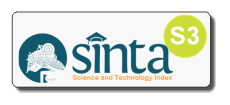“Who Am I”: The Role of Character Strength in Self-Awareness Emerging Adulthood
Abstract
Full Text:
PDFReferences
Akhnaf, A. F., Putri, R. P., Vaca, A., Hidayat, N. P., Az-Zahra, R. I., & Rusdi, A. (2022). Self Awareness dan Kecemasan pada Mahasiswa Tingkat Akhir. Jurnal Muara Ilmu Sosial, Humaniora, Dan Seni, 6(1), Article 1. https://doi.org/10.24912/jmishumsen.v6i1.13201.2022
Arnett, J. J. (2014). Emerging Adulthood: The Winding Road from the Late Teens Through the Twenties (1st ed.). New York: Oxford University Press.
Beaton, D. E., Bombardier, C., Guillemin, F., & Ferraz, M. B. (2000). Guidelines for the Process of Cross-Cultural Adaptation of Self-Report Measures. Spine, 25(24), 3186–3191. https://doi.org/10.1097/00007632-200012150-00014
Figueroa, C. A., & Aguilera, A. (2020). The Need for a Mental Health Technology Revolution in the COVID-19 Pandemic. Frontiers in Psychiatry, 11, 523. https://doi.org/10.3389/fpsyt.2020.00523
Helawati, R. (2022). Pengaruh Self Awareness Terhadap Perilaku Menyontek Mahasiswa Psikologi Islam UIN Antasari. Jurnal Al-Husna, 3(1), 31–46. https://doi.org/10.18592/jah.v3i1.5645
Karris Bachik, M. A., Carey, G., & Craighead, W. E. (2021). VIA Character Strengths Among U.S. College Students and Their Associations With Happiness, Well-Being, Resiliency, Academic Success and Psychopathology. The Journal of Positive Psychology, 16(4), 512–525. https://doi.org/10.1080/17439760.2020.1752785
Khairunnisa, H. (2017). Self Esteem, Self Awareness dan Perilaku Asertif pada Remaja [Bachelor’s thesis]. Universitas Muhammadiyah Malang.
Kreibich, A., Hennecke, M., & Brandstätter, V. (2020). The Effect of Self–Awareness on the Identification of Goal–Related Obstacles. European Journal of Personality, 34(2), 215–233. https://doi.org/10.1002/per.2234
Lavy, S. (2020). A Review of Character Strengths Interventions in Twenty-First-Century Schools: Their Importance and How They Can Be Fostered. Applied Research in Quality of Life, 15(2), 573–596. https://doi.org/10.1007/s11482-018-9700-6
Masi, L. M., Lohmay, I., Febriana, F., Jemadun, F. V., & Radja, J. A. D. (2022). Self-Awareness dan Self-Management Mahasiswa dalam Mengikuti Pembelajaran Praktikum Selama Masa Pandemi Covid-19. EDUKATIF: Jurnal Ilmu Pendidikan, 4(4), Article 4. https://doi.org/10.31004/edukatif.v4i4.2972
McGrath, R. E. (2015). Character Strengths in 75 Nations: An Update. The Journal of Positive Psychology, 10(1), 41–52. https://doi.org/10.1080/17439760.2014.888580
Niemiec, R. M., & Pearce, R. (2021). The Practice of Character Strengths: Unifying Definitions, Principles, and Exploration of What’s Soaring, Emerging, and Ripe With Potential in Science and in Practice. Frontiers in Psychology, 11, 590220. https://doi.org/10.3389/fpsyg.2020.590220
Oden, K. A., Miner-Holden, J., & Balkin, R. S. (2009). Required Counseling for Mental Health Professional Trainees: Its Perceived Effect on Self-Awareness and Other Potential Benefits. Journal of Mental Health, 18(5), 441–448. https://doi.org/10.3109/09638230902968217
Park, N., & Peterson, C. (2009). Character Strengths: Research and Practice. Journal of College and Character, 10(4), 1–10. https://doi.org/10.2202/1940-1639.1042
Peterson, C., & Seligman, M. E. P. (2004). Character Strengths and Virtues: A Handbook and Classification (pp. xiv, 800). Washington, DC: American Psychological Association.
Sari, M. A. D. I., & Wulanyani, N. M. S. (2020). Peran Kekuatan Karakter Harapan, Spiritualitas dan Kebaikan Terhadap Resiliensi Penduduk di Pemukiman Kumuh di Denpasar Barat. Jurnal Psikologi Udayana, Edisi Khusus Kesehatan Mental dan Budaya 2, 120–131. https://ojs.unud.ac.id/index.php/psikologi/article/view/63515/36233
Shadiqi, M. A. (2023). Statistik untuk Penelitian Psikologi dengan SPSS (Lengkap dengan Ilustrasi dan Cara Pelaporan American Psychological Association). Depok: PT. RajaGrafindo Persada.
Shalsabilla, R. C. P., Pratikto, H., & Aristawati, A. R. (2023). Self Injury pada Dewasa Awal: Bagaimana Peranan Self Awareness? INNER: Journal of Psychological Research, 2(4), Article 4.
Silvia, P. J., & O’Brien, M. E. (2004). Self-Awareness and Constructive Functioning: Revisiting “The Human Dilemma.” Journal of Social and Clinical Psychology, 23(4), 475–489. https://doi.org/10.1521/jscp.23.4.475.40307
Stuntz, C. P. (2019). Differences in Character Strengths Levels and Associations with Positive Outcomes Across Contexts. Journal of Positive Psychology and Wellbeing, 3(1), Article 1. https://journalppw.com/index.php/jppw/article/view/30
Sugiyono. (2016). Metode Penelitian Kuantitatif, Kualitatif, dan R&D. Bandung: CV Alfabeta.
Sutton, A. (2016). Measuring the Effects of Self-Awareness: Construction of the Self-Awareness Outcomes Questionnaire. Europe’s Journal of Psychology, 12(4), Article 4. https://doi.org/10.5964/ejop.v12i4.1178
Taylor, Z. E., Doane, L. D., & Eisenberg, N. (2014). Transitioning From High School to College: Relations of Social Support, Ego-Resiliency, and Maladjustment During Emerging Adulthood. Emerging Adulthood, 2(2), 105–115. https://doi.org/10.1177/2167696813506885
Wilkins, P. (2015). Person-Centred Therapy: 100 Key Points (2nd ed.). London: Routledge. https://doi.org/10.4324/9781315765198
DOI: http://dx.doi.org/10.17977/um023v12i22023p294-301
Refbacks
- There are currently no refbacks.
Copyright (c) 2023 Jurnal Sains Psikologi

This work is licensed under a Creative Commons Attribution 4.0 International License.
Reference Manager :
|
Aliansi:
Plagiarism Checker :
This work is licensed under a Creative Commons Attribution 4.0 International License.



1.png)








